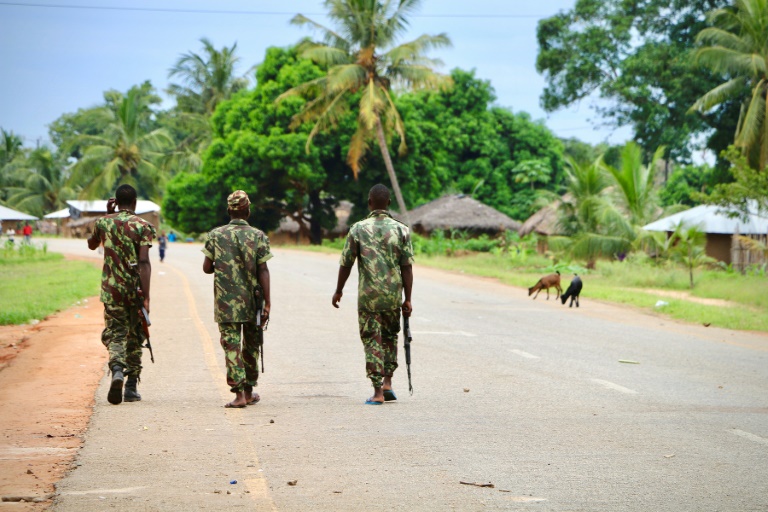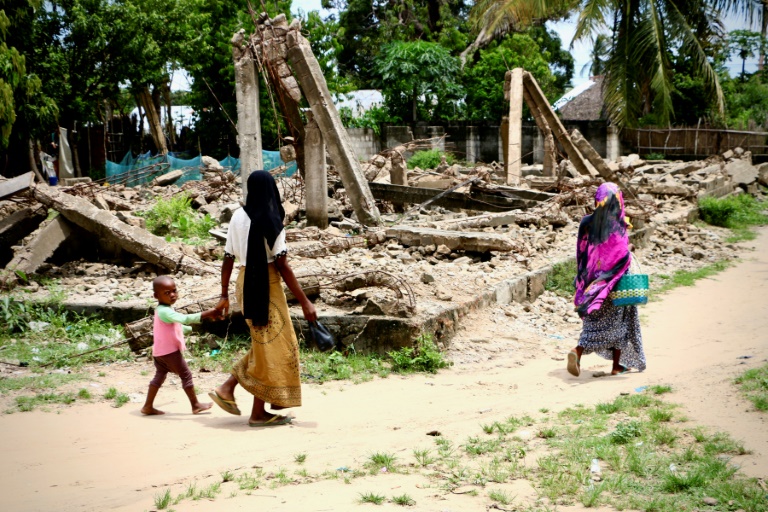After several deadly jihadist attacks, thousands of villagers have fled their homes in northern Mozambique for the safety of a chain of nearby tourist islands.

Fatima Uaide stood in the shallow, warm water of the Indian Ocean off the shore of northern Mozambique, waiting for a ferry to a tropical holiday island a few miles away.
But Fatima and her five children were not travelling out of choice. They abandoned their rice fields, livestock and simple existence in Nathuco village after it was targeted by jihadists who have left a trail of destruction through the region in recent weeks.
“I’m going to Matemo. I left everything in the fields,” she said as the water lapped her bare feet and her children plucked small crabs from the soft sand.
“It’s the rice harvesting season but I’m going to lose everything. We are going to starve – but it is best to escape to save the lives of these children.”
Thousands of villagers like her have fled their homes in northern Mozambique for the safety of a chain of nearby tourist islands after coming under attack from a shadowy group that officials say is made up of radical jihadists.
More than 30 people have been killed in similar attacks since last month and many more injured – but no one knows how many been displaced by the violence.
Many of those who have fled are forced to sleep rough. The more fortunate among them have sought refuge with family or been taken in by strangers elsewhere in the majority-Muslim Cabo Delgado region.

Mozambican troops patrol the streets of Mocimboa da Praia in Mozambique’s north, a marginalised region where radical Al-Shabaab-style ideology has found a receptive audience.
‘Escape the danger’
Attacks on coastal communities have triggered a massive displacement of people to the Quirimbas archipelago, described by tour operators as “breathtakingly beautiful” and popular with tourists for its diving reefs and whale and dolphins sightings.
Others have fled to the provincial capital Pemba or Macomia, another town.
The islands are ill-equiped to handle such an influx and have no schools or hospitals, raising the spectre of a humanitarian crisis.
“This place has made it easier to escape the danger we faced there,” said Atanasio Nacir, a teacher from Naunde who had taken refuge in an administrative building.
Attackers recently killed and beheaded seven villagers in the village, prompting more than half of its 2,300 people to flee.
“The village school had 378 students – but now pupils are scattered in different places and we don’t know where,” said the teacher who added that the crisis had forced the school to close.
The government has not yet set up shelter for many of those displaced by the attacks or delivered aid to those most in need.
“What we need most are tents to house the people whose houses were burned down,” Maurice Miranda, a village leader in Naunde, told AFP. “There are families here who have lost their homes, they are sleeping under the trees. We have not received any help yet”.

Mozambique’s government ordered the mosque in Mocimboa da Praia be razed after an attack blamed on radicalised youth who allegedly worshipped there
‘Nobody is helping’
Luiz Fernando Lisboa, Pemba’s Catholic bishop, has criticised the government for failing the victims of the region’s nascent insurgency.
“Unfortunately these terrible events have had no clear response from the central government,” said Lisboa, adding at 900 displaced people have sailed to Ibo, another Matemo island.
“We’re giving support to those who’ve been displaced – but it’s not enough. There are homes where more than 20 people are living.”
Seven days after the Naunde village attack, Macomia town official Joaquina Nordine delivered charitable donations to the survivors.
“We showed our solidarity with clothes, buckets and other utensils – all contributions from the people,” said Nordine.
Matemo and Ibo islands, which sit a short boat ride from the villages targeted by attackers, have already been deluged by survivors now living in cramped conditions.
“The situation is chaotic and nobody is helping the displaced,” said an island tour guide reached by telephone.
For the country’s National Institute of Disaster Management (INGC) to intervene, the cabinet must first declare an emergency.
Something that the survivors sheltering on Matemo hope will happen soon.






